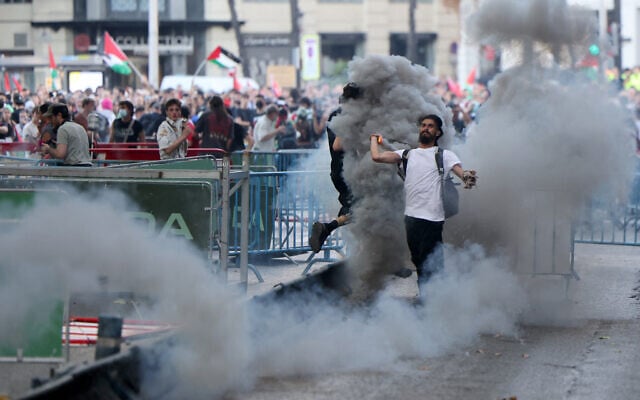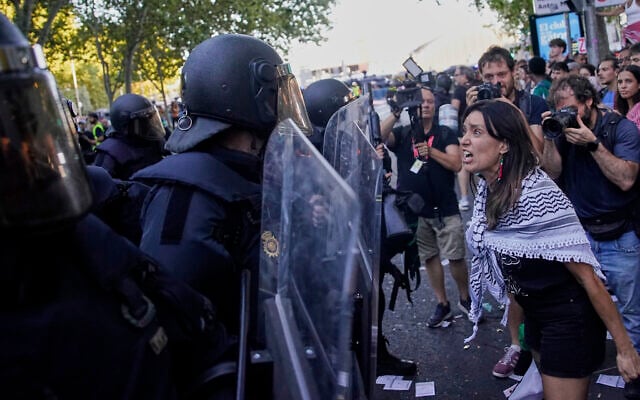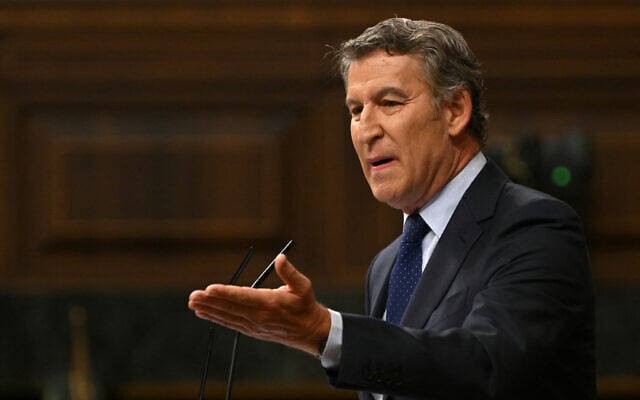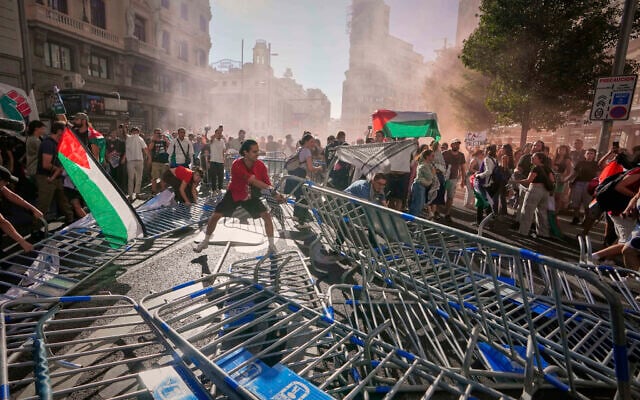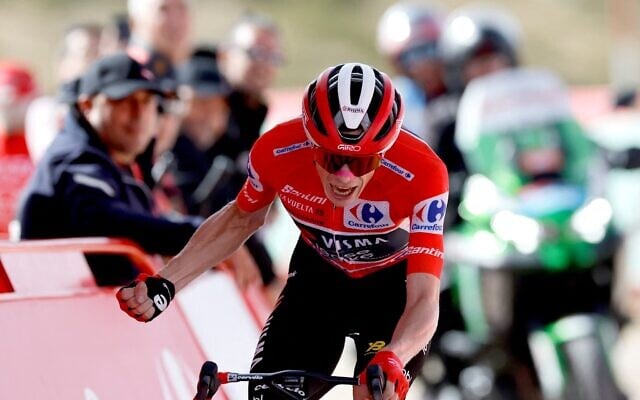

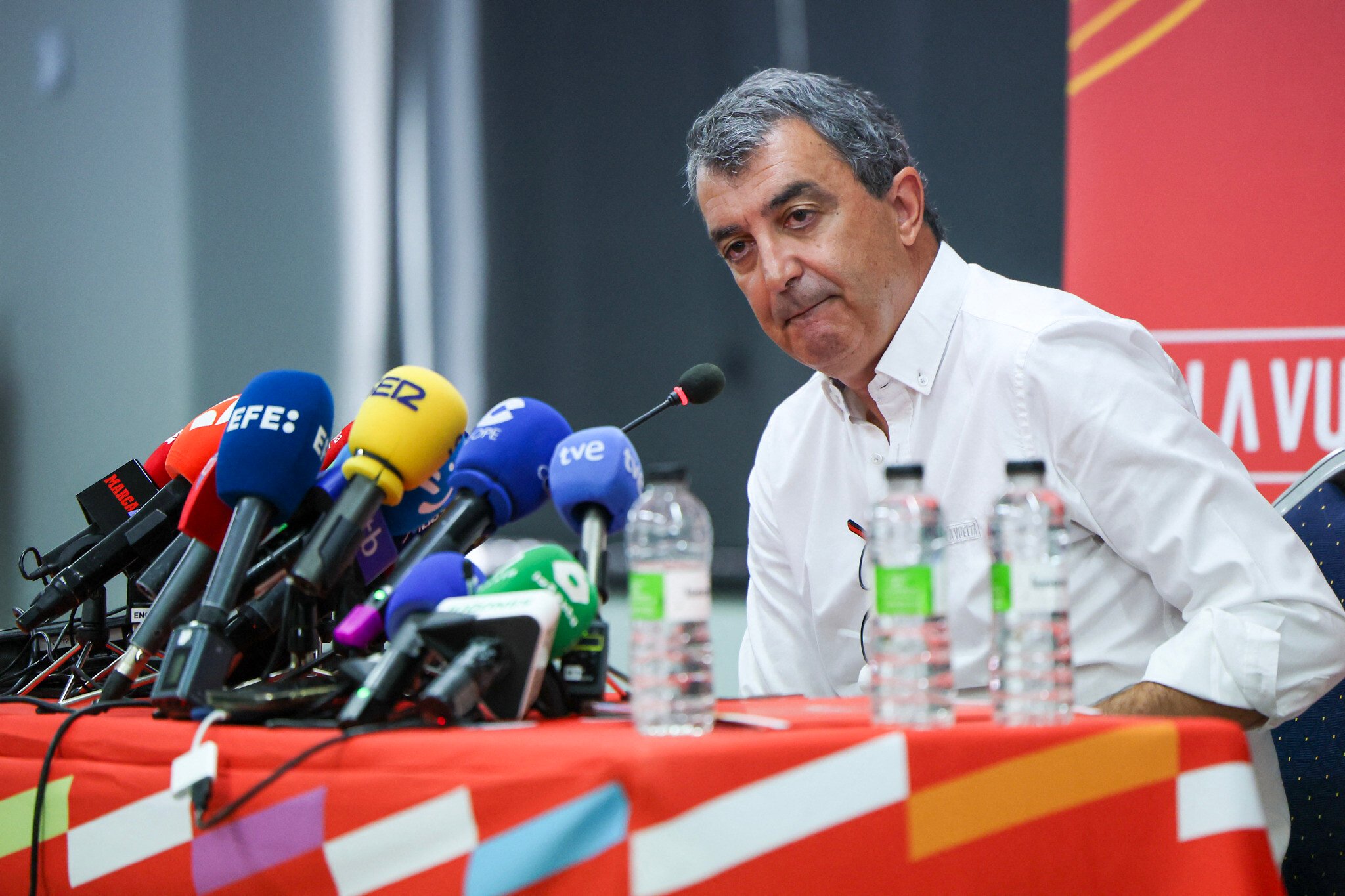
The director of the Vuelta a España bicycle race defended on Monday his decision to keep an Israel-based team in the competition despite anti-Israel protests that ultimately forced the race’s final stage to be abandoned over the weekend.
Meanwhile, Spanish opposition figures and Madrid’s conservative mayor rejected Prime Minister Pedro Sanchez’s endorsement of the protests, calling the chaos an “international embarrassment” and a sad day for the capital city.
Javier Guillén, the Vuelta’s director, said there was nothing organizers could have done regarding the presence of the Israeli team.
“The Vuelta’s position was clear, we had to abide to the norms of the International Cycling Union. It’s the UCI that regulates the right of admission to the race,” he said in a news conference. “We never got into any other type of debate. All we wanted to do was to be able to finish the race with normalcy, and that wasn’t possible.”
On Monday, Sánchez reiterated his “deep admiration” for the protesters who shut down the final and called for Israel to be banned from international sporting events.
Demonstrators had taken issue with the inclusion in the race of Israel-Premier Tech, a private team unaffiliated with the Israeli government.
“When you call for a boycott of the race and the race is boycotted, that obviously hurts those who are involved in the race,” Guillén said, though he added that he was not referring specifically to comments by Sánchez.
Guillén noted that Israeli teams and athletes have been allowed to compete everywhere else in the world, and that the Vuelta had no right to try to keep them from racing in the Grand Tour event in Spain.
He added that the Vuelta protests will likely force authorities to look at preventive actions ahead of other sporting events.
“After this Vuelta, the international entities will need to make decisions and cycling will need to have some internal discussions to find solutions,” he said.
Guillén said he hopes there will be solutions in place by the time next year’s Tour de France begins with a stage in Barcelona.
“Hopefully everything will be solved by then,” he said. “I don’t want to speculate with any possibilities. I’m sure Barcelona will have a great Tour de France.”
Guillén said the UCI wants information about what happened during the Vuelta so it can try to “confront the future.”
Spanish opposition leaders criticized Sánchez for his repeated praise of the anti-Israel protesters who cut the race short.
The leader of the main opposition PP party, Alberto Nunez Feijoo, wrote on X late Sunday that “the government has allowed and induced the non-completion of the Vuelta and, in this way, an international embarrassment televised worldwide.”
“The head of government is proud of the actions of a few who, in support of Gaza, threw barriers at the national police… Not me. I defend freedom of expression as long as it does not involve violence or public disorder,” he added.
Madrid’s conservative mayor, José Luis Martínez-Almeida, also criticized Sánchez and described Sunday’s events as a sad day for the Spanish capital.
Sánchez has been a fierce critic of Israel’s 23-month war in Gaza, which was triggered by the Hamas terror group killing 1,200 people and kidnapping 251 during its October 7, 2023, onslaught in southern Israel.
Foreign Minister Gideon Sa’ar on Sunday called Sánchez a “disgrace to Spain” for what he characterized as the incitement of a mob against the bike race. He also noted the Spanish leader’s remark days earlier “that he did not have an atomic bomb ‘to stop Israel.’”
Around 100,000 protesters were present for the final stage of the race on Sunday, according to Spanish authorities. It was due to finish with several loops in Madrid, but was cut short around 60 kilometers (37 miles) before the finish in the Spanish capital.
The Israel-Premier Tech team, owned by Israeli-Canadian property developer Sylvan Adams, had rebuffed calls to drop out of the race, though it agreed to change its jersey to a monogrammed kit with only the team’s logo, in the hope of being less conspicuous.
On Sunday, protesters pushed over barriers and stood in the road where cyclists were due to pass in various places along the route.
After the stage was scrapped, they chanted: “Palestine won this Vuelta.”
Police had initially intervened at another point along the route, but ultimately allowed the protesters to occupy the roadway.
The unrest was the culmination of pro-Palestinian, anti-Israel protests that disrupted the three-week race on several occasions. Even before the final day, race organizers had to shorten some stages and demonstrators had caused crashes after bursting onto the course.
Danish rider Jonas Vingegaard, who was leading the overall classification going into the final stage, was declared the winner of the Vuelta, but the customary podium ceremony was canceled.
“It’s a pity that such a moment of eternity was taken from us,” Vingegaard said. “Everyone has the right to protest, but not in a way that influences or endangers our race.”
The teams reportedly improvised a private podium ceremony later so riders could celebrate.
“Everything that happened was unacceptable,” Guillén said. “Obviously it was a very sad day. We faced very, very difficult moments. The images speak for themselves.”


